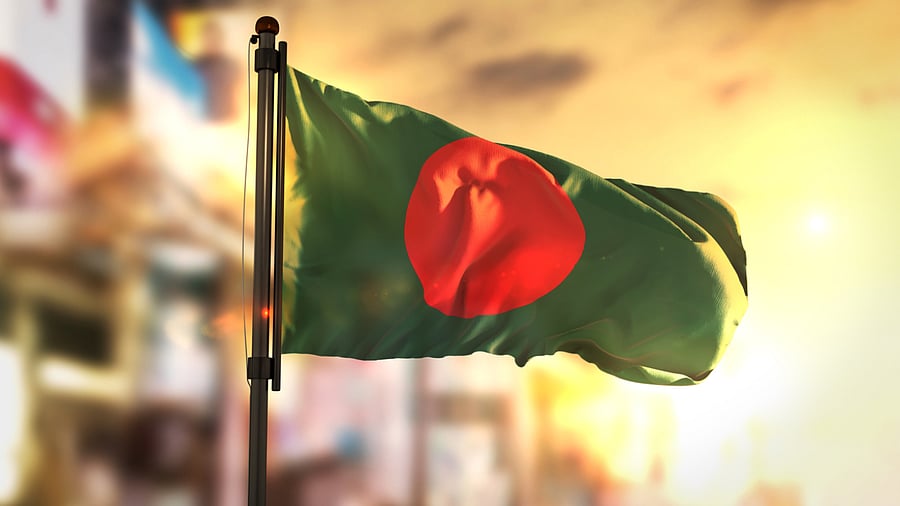
Bangladesh flag.
Credit: iStock Photo
New Delhi: Several hundred people and police enforced strict vigil around the residence and shrine of Bangladesh’s founding father Sheikh Mujibur Rahman, preventing his supporters from commemorating the 50th anniversary of his brutal assassination.
Mujibur Rahman, fondly called Bangabandhu, was killed in a military coup on August 15, 1975 along with most of his family members. His two daughters - Sheikh Hasina and Sheikh Rehana - survived the massacre as they were abroad at the time.
Witnesses and reports said several hundred people in a violent mood overnight took position at Dhaka’s 32 Dhanmandi, Mujibur Rahman's private residence, which was turned into a memorial museum. The building was levelled following the ouster of the Awami League regime of his daughter and then prime minister Hasina on August 5, 2024.
The interim government chief Muhammad Yunus, who replaced Hasina after she fled the country on August 5, has disbanded the Awami League's activities until completion of the trial of the ousted prime minister and leaders of her regime and party. The interim government also scrapped the status of August 15 as the 'National Mourning Day'.
Through Thursday night and on Friday, the crowd outside Mujibur Rahman's residence chanted slogans in favour of former prime minister Khaleda Zia’s Bangladesh Nationalist Party (BNP), and the far-right Jamaat-e-Islami’s student wing Chhatra Shibir also joined them.
According to witnesses, the newly formed National Citizen Party (NCP), a large offshoot of Students against Discrimination (SAD) that led last year’s violent protests that toppled Hasina's government, however, were not present at the scene at Dhanmondi. However, some people reportedly belonging to the NCP were present but did not take part in sloganeering.
The mob enforced a strict vigil and assaulted several individuals, suspecting them of being supporters of the Awami League, according to witnesses and video clips that soon went viral on social media.
“The riot police with APCs (armoured personnel carriers) stood by on the sidelines and detained the assaulted people as the mob handed them over to the security personnel,” a journalist at the scene said.
One of the video footage showed an angry crowd suspecting a middle-aged woman of being an Awami League activist and asking her why she came to 32, Dhanmondi. They forced her to say, “I have made a mistake, which I will not repeat in my life,” before letting her go away.
Meanwhile, in northwestern Gopalganj’s Tungipara, the village home and site of Mujibur Rahman's shrine, the armed police overnight blocked all three gates leading to his grave and enforced a tight vigil, a local journalist said.
“Therefore, none could enter there to offer wreaths or pray for his eternal peace,” he said.
The resident, who preferred anonymity, recalled that tens of thousands of people used to throng on the anniversary day, and army soldiers would pay the state honour with a military band playing the Last Post, the bugle call used at military funerals, when the Awami League was in power.
The authorities had earlier called in extra police forces, including a huge number of special Armed Police Battalion (APBN) platoons to maintain order through Gopalganj district.
Gopalganj was where the residents and Awami League activists had a violent clash with army troops, leaving half a dozen people dead, some months ago.
Earlier, Yunus’ press secretary Shafiqul Alam had warned: “If any Awami League activist wants to take any programme defying the ban, definitely he will be brought under the purview of law, between August 15 and August 30.” Hasina's son Sajeeb Wazed, who stays in the USA, in a long post on X said, “Today, to those who went to 32 Dhanmondi and endured injustice and oppression - from the depths of my heart, I extend both my gratitude and my deepest sympathy.” “Bangabandhu does not belong to any one political party - Bangabandhu belongs to Bangladesh,” he said, adding, “Today we vow - we will free Bangladesh from the grip of anti-liberation and anti-national forces. Together, forgetting all divisions, we will protect our beloved country.” Major newspapers previously came up with special supplements on Rahman, analysing his prolonged struggle in uniting people initially against disparity and demanding autonomy for what was called East Pakistan and eventually for independence from Pakistan, waging the 1971 Liberation War.
But this year, the mainstream media carried only brief reports or opinion pieces to mark the anniversary.
“Silences around his legacy speak as loudly as tributes,” The Daily Star newspaper wrote in an article, adding that “between sanctification and omission lies a spectrum of memory, where presence is haunted by absence, and the nation's founding myth is both celebrated and disputed.” A bunch of 1971 Liberation War veterans, not belonging to Awami League, recently formed a group 'Manch ‘71' to counter what they called a government-sponsored desperate campaign to deviate Bangladesh’s political course from the Liberation War spirit.
Senior lawyer ZI Khan Panna, one of its leading figures, had on Thursday night told a social media talk show that he planned to visit the Banani graveyard, where Mujibur Rahman’s wife and other family members were buried, to offer prayers.
But in a Facebook post on Friday, Panna briefly wrote: “I have been confined in my house, (but) not arrested.”